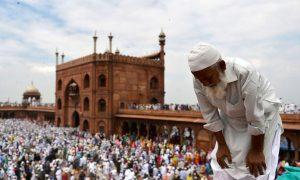Muslims and the Minority Question
By Zafarul-Islam Khan
For Muslims to live as a minority community is not a new or unusual phenomenon. This has been a common feature in history. As a matter of fact, for 13 years they remained a minority in Makkah as well. For years, they lived as a minority in Abyssinia. Even in Medina, before the Conquest of Makkah by the Holy Prophet (pbuh), Muslims were a minority though, through his visionary policies and the Constitution of Medina, the Holy Prophet had established Muslims’ supremacy in Medina. Similarly, after the end of the Muslim rule in Andalus and Sicily, Muslims lived there as a minority for a long time. During later centuries, for Muslims living as minorities became a common phenomenon and thus large Muslim minority communities came into existence in China, Russia, Eastern Europe and the Subcontinent.
A Muslim living as a minority in a non-Muslim country is as much a Muslim as someone living in a Muslim majority country in the same way as the Muslims living in Makkah were as good Muslims as those living in Medina.
In the pre-Islamic era, history records Christians and Jews living as minorities in different countries. Not only did the Prophet Yusuf (AS) accept to live in Egypt as a minority but he even sought the post of the minister of supplies in the court of the Pharaoh and served it in the best manner possible.
In today’s world, Muslims are living in more than a hundred countries as minorities while in 58 countries they are a majority. In our own country, India, Muslims exist as the largest Muslim minority of the world.
In Islamic countries, the rights of Dhimmies (protected religious minorities) were not only protected but under the strict instructions by the Prophet (pbuh) they were treated with honour and good behaviour. This remained the practice during the Umayyad, Abbasid and Fatimid caliphates and also under later Islamic sultanates. The ‘Millat System’ remained in force until the last days of the Ottoman Caliphate under which religious minorities were granted religious autonomy and enjoyed full religious freedom.
Until recently, Jews and Muslim minorities in European countries were not treated fairly. It was only in the beginning of the 20th century, after the demise of the monarchy in Russia and the breakup of the Ottoman Empire that international laws were formulated under the League of Nations and later under the United Nations Organisation. Several international treaties were signed clearly enshrining the rights of the minorities and giving them equal citizens’ status. As a result, and at least as far as the law is concerned, in all countries religious, cultural, linguistic and ethnic minorities are now treated fairly.
In 1992, United Nations published a historic document known as the UN Declaration on the Rights of Persons belonging to National or Ethnic, Religious or Linguistic Minorities. In 1998, United Nations passed yet another resolution outlining the duties of governmental and non-governmental agencies towards minorities. In addition, these international laws and agreements also provide various benefits to minorities which benefit from many other international declarations such as:
– UN Charter, 1945;
– Universal Declaration of Human Rights, 1948;
– International Covenant of Economic, Cultural and Social Rights, 1966;
– Convention on the Elimination of All Forms of Racial Discrimination, 1965;
– Declaration on the Elimination of All Forms of Intolerance and Discrimination Based on Religion or Belief, 1981;
– Declaration & Programme of Action adopted by the World Conference on Human Rights, Vienna, 1993.
There has been quite a lot of research and work on the subject of ‘minority rights’ in western countries. For example, there is a research organization known as Minority Rights Group in London which was established in 1968. Our country lags much behind in this field.
Our (Indian) constitution guarantees very clearly minorities’ rights to the protection of their religious and cultural identities. For example, Article 25 specifies fundamental rights and Article 30 guarantees minorities’ right to establish and run their institutions).
It is our duty, through public opinion and legal means, to pressurize our government and government institutions to act upon these Articles of the constitution and respect international laws and treaties as the Government of India is a signatory to them. It is a fact that international laws and obligations supersede national laws.
The international community has, to a great extent, been able to protect the rights of minorities generally but has so far failed to form a clear opinion about Zionism and the cruel caste system of India under which the Arabs of Palestine on the one hand and the Dalits and Adivasis of India on the other are being treated very unfairly. Hindutva, too, falls in this category as it discriminates against the citizens of the country on the basis of religion. Although our Supreme Court had earlier misinterpreted Hindutva and called it an expression of culture, a recent judgement has, to an extent, invalidated the earlier one.
The international community has, to a great extent, been able to protect the rights of minorities generally but has so far failed to form a clear opinion about Zionism and the cruel caste system of India under which the Arabs of Palestine on the one hand and the Dalits and Adivasis of India on the other are being treated very unfairly. Hindutva, too, falls in this category as it discriminates against the citizens of the country on the basis of religion. Although our Supreme Court had earlier misinterpreted Hindutva and called it an expression of culture, a recent judgement has, to an extent, invalidated the earlier one.
To show the world the real colours and nature of Hindutva, we will have to wage a long legal and political battle, otherwise we face the danger of losing all of our rights as minorities. Recently, a top leader of RSS has said that Muslims who want to follow their personal laws should be deprived of their voting rights. In other words, if Muslims wish to follow Shari’ah, they will have to forego their political rights.
Since the last few decades, the new phenomenon of Globalisation has emerged. Under it, not only commodities and beliefs but also human beings are moving fast from one place to another. In today’s world, our old terminologies of Darul Harb, Darul Kufr and Darul Islam have lost their relevance. In today’s world, it is more likely that you may enjoy more freedom in a non-Muslim country to follow and preach your religion than in a ‘Muslim’ country. In non-Muslim countries, such as western countries, law is supreme but in Muslim countries the ruler or the government’s dictate is supreme.
In the early period of Islam, not even a single example can be found where any Muslim minority had attacked the government or army of the host country. But during the last few decades Muslim minorities have taken up arms against the governments of their host countries. Philippines and Thailand are one example. In return, Muslims of such countries have been the losers in the end. Some weeks back Myanmar army launched attacks on its Rohingya Muslim minority. In reaction, an armed group of the Rohingyas attacked the army and the result is that now they are being associated with Al-Qaida and ISIS. This was a foolish act caused 60,000 Rohingyas to flee and take refuge in neighbouring Bangladesh while almost same number of them have become homeless living in camps within Myanmar itself.
In our own country, by taking up arms during the last three decades, some of our zealot Kashmiri brothers have achieved nothing but loss. Had they restricted themselves to political struggle, they would have made some gains. By firing few worthless bullets at the army and the police, we provide them with an unrestricted justification of attacking our localities and civilians. Each action has a reaction. This is a natural phenomenon. Therefore, before taking any action, we must give a deep thought to the possible reaction as well.
And lastly: Do discuss the rights of minorities but, please also spare some time to ponder over the duties of minorities and the methods of your participation in the host country’s political, social and economic affairs so that you start being seen as an asset and a blessing and not as a burden. Can we say, with all honesty, that Muslims’ role in non-Muslim countries is an asset and blessing?
The writer is an Islamic scholar, writer and editor of The Milli Gazette. This talk was delivered at the Islamic University, Shantapuram (Kerala).
Translated by Urdu Media Monitor.Com from the author’s blog http://www.zik.in

